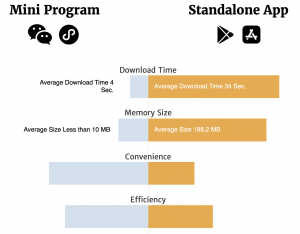The Network Effect of a Chinese E-Commerce Platform (Alibaba) and Social Media app (WeChat)
Source: https://www.cdxe.de/en/blog/how-alibaba-and-wechat-built-their-ecosystem-with-customer-experience-in-mind
Alibaba is an e-commerce and retail service platform like e-bay and amazon. Alibaba.com later became the world’s largest online B2B trading platform for small businesses as of 2014 (Wikipedia). WeChat is a Chinese multi-purpose instant messaging, social media and mobile payment app developed by Tencent (Wikipedia). Both platforms utilize network effects to build their ecosystems.
The spotlight of WeChat’s development is on functionality, particularly functions that connect users to other businesses both online and offline. WeChat’s development team took one step further after the triumph of WeChat Pay (mobile payment) and established Mini Programs, which allowed hundreds of businesses to take advantage of WeChat’s user base and infrastructure. The Mini Programs program is an excellent example of a win-win situation that benefits users, businesses, and WeChat itself. It allows consumers to communicate with thousands of different businesses both online and offline with minimal effort. The diagram compares the download tome, memory size, convenience, and efficiency of the Mini Program and the Standalone App. 
“The far-reaching and ever-expanding use cases that WeChat has successfully made itself relevant in have further grown its network effects” (Wu). The more WeChat users there are, the more companies will create Mini Apps; the more Mini Apps there are, the greater convenience for users is created. WeChat’s network effects are based on an ever-increasing relevance factor, where staying relevant involves staying on top of customer behaviors, needs, trends, and goals. WeChat keeps track of all of these variables in real-time.
Alibaba’s new retail strategy, aiming to digitalize physical retail stores, assists the operations of independent convenience stores by providing them with the appropriate digital tools. Alibaba provides these stores with “assortment analytics that help stores know what items are popular and how much they should stock of each item” and “up to date POS systems that are well-integrated with Alibaba’s own ordering system” (Wu). The more insights and operational efficiency Alibaba delivers to these stores, the more likely they are to order their stock from Alibaba, resulting in more suppliers partnering with Alibaba and more customers getting what they want at more places. As more and more firms from various verticals become dependent on Alibaba’s network, this network effect has effectively put Alibaba at the forefront of retail in Mainland China. The more insights and operating efficiency Alibaba delivers to these stores, the more likely business are to purchase their stock through Alibaba, resulting in more suppliers partnering with Alibaba and more clients getting what they want in more locations. As more and more firms from various industries become dependent on Alibaba’s network, this network effect has effectively put Alibaba at the forefront of retail in Mainland China.
